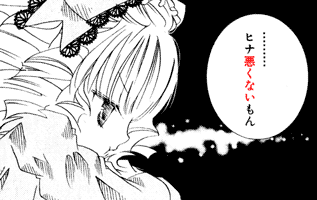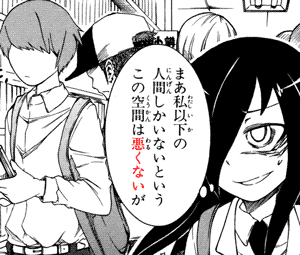The word warukunakatta 悪くなかった, "was not bad," past negative form, would also work similarly but in the past.
Manga: Rozen Maiden, ローゼンメイデン (Chapter 14)
"Not Bad"
The antonym of warui 悪い, "bad," would be ii いい, "good," but sometimes people say something is "not bad" instead of saying something is"good." This happens in both English and Japanese. The choice of warukunai over ii can happen for a number of reasons:- Saying "good" sounds too strong of an endorsement, so you say "not bad" instead. A word of mild approval.
- You wanted something else, but this isn't bad either; it's satisfactory.
- Someone said something was bad, warui, and you're denying by saying it's not bad, warukunai.
Manga: Watashi ga Motenai no wa Dou Kangaetemo Omaera ga Warui! 私がモテないのはどう考えてもお前らが悪い! (Chapter 4)
- Context: nerd girl likes place full of nerds.
- maa まあ
Well. - watashi ika no
ningen shika inai toiu
kono kuukan wa warukunai ga
私以下の
人間しかいないという
この空間は悪くないが
This space [in which]
[there's nobody better than me]
isn't bad, though.- watashi ika no ningen
私以下の人間
Humans equal-or-below me.
Humans lesser than me.
People worse than me. - ...shika inai ~しかいない
There's nobody but... [humans lesser than me, in this place.] - ga が
But. However. Though.
- watashi ika no ningen
Some examples including set phrases:
- atama ga warukunai 頭が悪くない
"Head isn't bad."
He's isn't dumb. He's pretty smart, actually. - naka ga warukunai 仲が悪くない
"Relationship isn't bad."
Their relationship isn't bad. They're in good terms, actually.
"Not My Fault"
In Japanese, sometimes warui 悪い can be used to blame someone for something: "it's his fault." Therefore, warukunai, being negative, can be used to say "it's not his fault."- kare ga warui 彼が悪い
He's bad.
It's his fault. - kare ga warukunai 彼が悪くない
He's not bad.
It's not his fault.
Manga: Rozen Maiden, ローゼンメイデン (Chapter 14)
- Context: Hina-Ichigo 雛苺 pouts.
- .........
- Hina warukunai mon
ヒナ悪くないもん
"Hina isn't bad."
It isn't Hina's fault.- Hina
In Japanese, sometimes children will use their own names instead of first person pronouns (watashi, boku, ore, etc.) - mon もん
A contraction of mono もの and sentence-ending particle often used by children.
- Hina
"Nothing Wrong With This"
In Japanese, sometimes warui 悪い can be used to ask "what's wrong about this?" Specially when the speaker thinks there's nothing wrong with it. The word warukunai can be used in a similar way to say there's nothing wrong with what the speaker is doing.- tasukeru 助ける
To help. (with an emergency: help me!)
To save.- tetsudau 手伝う
To help. (with more trivial stuff: help cleaning the room.)
To assist.
- tetsudau 手伝う
- hito wo tasukete nani ga warui?
人を助けて何が悪い?
"Saving people, what's bad?"
What's wrong with saving people?
(i.e. I'm trying to save people here, you're telling me I'm wrong? Why? Why do you go against me! I'm the good guy here!) - hito wo tasukeru no wa warukunai!
人を助けるのは悪くない!
"Saving people isn't bad!"
There's nothing wrong with saving people!
Further Reading
See Also
- yokunai よくない
Just like warukunai is sometimes used instead of ii, the word yokunai is sometimes used instead of warui.


No comments: